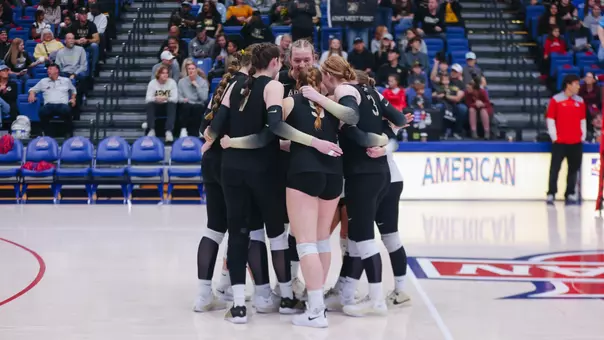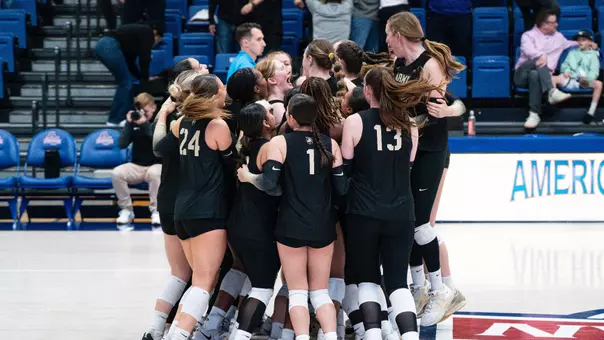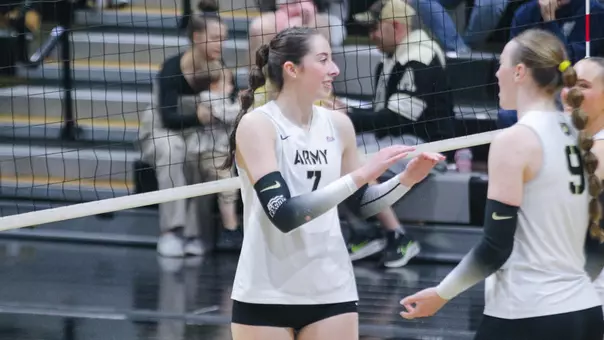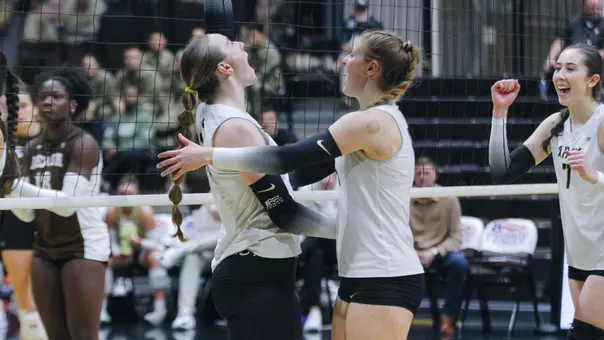Army West Point Athletics

Volleyball’s Isabella Sullivan Named 2024 NCAA Woman of the Year Nominee
August 14, 2024 | Volleyball
BETHLEHEM, Pa. – Former Army West Point volleyball captain and 2024 West Point graduate 2LT Isabella Sullivan has been named one of the Patriot League's nominees for the 2024 NCAA Woman of the Year Award. Also nominated for the award from the Patriot League is Loyola Maryland's Sydni Black from the Greyhounds' women's lacrosse team.
Sullivan and Black are two of the Division I nominees on the NCAA Woman of the Year Award ballot among a record 627 nominations submitted this year. The Patriot League's Senior Woman Administrators selected their nominees based on four categories – academics, athletics, service, and leadership.
Earlier this year, Sullivan became just the ninth Patriot League student-athlete to receive a Rhodes Scholarship. On the court, Sullivan was a two-time team captain and helped guide the Black Knights to the No. 2 seed in the Patriot League Championship in each of the last two seasons, the team's best seeding since 2015.
The San Antonio, Texas native served as the Regimental Commander for Cadet Basic Training in the summer of 2023, overseeing the training and development of 1,250 new cadets as they entered West Point. Sullivan has volunteered at West Point's writing center, helping to develop a cultural competency training program that was adopted into Cadet Basic Training for the Class of 2025. She was one of the recipients of the 18th annual Coach Mike Krzyzewski Teach Character Through Sports Award, an honor that recognizes West Point cadet-athletes, coaches, officers in charge (OIC) and sports educators for their outstanding commitment to the development of noble character through athletic participation and leadership, as well as earning selection as a Scholar-Athlete of the Year from the Center for Enhanced Performance.
Sullivan graduated with her bachelor's degree as an international history major with honors and will pursue a Master of Science in Evidence-Based Intervention and Policy at the University of Oxford starting in the fall.
In a statement about her time with Army volleyball, Sullivan had the following to say.
"Out of the leadership roles and plethora of opportunities I have experienced, I was most fundamentally shaped by my career and leadership on the Army women's volleyball team. I was elected as a co-captain in May of my sophomore year, and this young leadership role quickly taught me critical skills that I would rely on over the next two years of leading within the Corps. More importantly, this role instilled a sense of purpose. Serving as a team captain forced me to lead in challenging and unconventional circumstances. When I began this role, I was in a class of 10 fellow juniors and averaged the least amount of playing time. I was navigating how to earn respect and trust in a competitive athletic environment where I lacked the authority of expertise. I had to derive purpose and confidence outside of playing time and take care of my team from the sidelines.
During the 18 months I served as team captain, I was responsible for the maintenance of an effective and healthy culture, and in my first season, we established the team motto as 'Grace. Growth. Grit.' I prioritized our team's development of cultural competency and character by hosting two formal luncheons. In these luncheons, we facilitated discussions on current events, their implications on women in the military, and the development of our character. Furthermore, I was largely responsible for the reintegration of a suspended player, and I was diligent in maintaining our team's academic performance. Leading as a team captain cemented my passion and excitement to lead larger teams at West Point.
After a humbling but inspiring first season, I felt that it was important to share the team motto with the larger organization, which I had the opportunity to do as the Cadet Basic Training 1 Commander. Balancing my leadership on the court and within the Corps, coupled with pursuing academic excellence and post-graduate scholarships, presented significant challenges. These difficult experiences, much like those that I had undergone within volleyball, reinforced the importance of mentoring young cadets. I wanted to use my experience over the last three years to inspire underclassmen to identify from where they derive their value and to consider their impact and how they are improving their community. I hoped to then encourage these young cadets to experience a purpose-driven career.
Army volleyball is where I experienced the least conventional success in my cadet career, yet this experience was the most valuable. I more deeply understood the importance of humility, grace, tenacity, and fostering a growth mindset. More importantly, I found purpose in mentoring and inspiring through leadership, and this revelation encouraged me to lead at the cadet regimental and brigade level. Army volleyball taught me that leadership is a constant process of learning. I am excited to learn more about new cultures and people at Oxford in the fall as a Rhodes Scholar. This formal and informal education will undoubtedly inspire me to continue leading and mentoring, much like Army volleyball has."
The NCAA Woman of the Year selection committee, comprised of representatives from the NCAA membership, will choose the top 30 honorees with 10 from each division. Those top 30 nominees will be recognized, along with the announcement of the 2024 NCAA Woman of the Year, at the 2025 NCAA Convention in January.
BETHLEHEM, Pa. – Former Army West Point volleyball captain and 2024 West Point graduate 2LT Isabella Sullivan has been named one of the Patriot League's nominees for the 2024 NCAA Woman of the Year Award. Also nominated for the award from the Patriot League is Loyola Maryland's Sydni Black from the Greyhounds' women's lacrosse team.
Sullivan and Black are two of the Division I nominees on the NCAA Woman of the Year Award ballot among a record 627 nominations submitted this year. The Patriot League's Senior Woman Administrators selected their nominees based on four categories – academics, athletics, service, and leadership.
Earlier this year, Sullivan became just the ninth Patriot League student-athlete to receive a Rhodes Scholarship. On the court, Sullivan was a two-time team captain and helped guide the Black Knights to the No. 2 seed in the Patriot League Championship in each of the last two seasons, the team's best seeding since 2015.
The San Antonio, Texas native served as the Regimental Commander for Cadet Basic Training in the summer of 2023, overseeing the training and development of 1,250 new cadets as they entered West Point. Sullivan has volunteered at West Point's writing center, helping to develop a cultural competency training program that was adopted into Cadet Basic Training for the Class of 2025. She was one of the recipients of the 18th annual Coach Mike Krzyzewski Teach Character Through Sports Award, an honor that recognizes West Point cadet-athletes, coaches, officers in charge (OIC) and sports educators for their outstanding commitment to the development of noble character through athletic participation and leadership, as well as earning selection as a Scholar-Athlete of the Year from the Center for Enhanced Performance.
Sullivan graduated with her bachelor's degree as an international history major with honors and will pursue a Master of Science in Evidence-Based Intervention and Policy at the University of Oxford starting in the fall.
In a statement about her time with Army volleyball, Sullivan had the following to say.
"Out of the leadership roles and plethora of opportunities I have experienced, I was most fundamentally shaped by my career and leadership on the Army women's volleyball team. I was elected as a co-captain in May of my sophomore year, and this young leadership role quickly taught me critical skills that I would rely on over the next two years of leading within the Corps. More importantly, this role instilled a sense of purpose. Serving as a team captain forced me to lead in challenging and unconventional circumstances. When I began this role, I was in a class of 10 fellow juniors and averaged the least amount of playing time. I was navigating how to earn respect and trust in a competitive athletic environment where I lacked the authority of expertise. I had to derive purpose and confidence outside of playing time and take care of my team from the sidelines.
During the 18 months I served as team captain, I was responsible for the maintenance of an effective and healthy culture, and in my first season, we established the team motto as 'Grace. Growth. Grit.' I prioritized our team's development of cultural competency and character by hosting two formal luncheons. In these luncheons, we facilitated discussions on current events, their implications on women in the military, and the development of our character. Furthermore, I was largely responsible for the reintegration of a suspended player, and I was diligent in maintaining our team's academic performance. Leading as a team captain cemented my passion and excitement to lead larger teams at West Point.
After a humbling but inspiring first season, I felt that it was important to share the team motto with the larger organization, which I had the opportunity to do as the Cadet Basic Training 1 Commander. Balancing my leadership on the court and within the Corps, coupled with pursuing academic excellence and post-graduate scholarships, presented significant challenges. These difficult experiences, much like those that I had undergone within volleyball, reinforced the importance of mentoring young cadets. I wanted to use my experience over the last three years to inspire underclassmen to identify from where they derive their value and to consider their impact and how they are improving their community. I hoped to then encourage these young cadets to experience a purpose-driven career.
Army volleyball is where I experienced the least conventional success in my cadet career, yet this experience was the most valuable. I more deeply understood the importance of humility, grace, tenacity, and fostering a growth mindset. More importantly, I found purpose in mentoring and inspiring through leadership, and this revelation encouraged me to lead at the cadet regimental and brigade level. Army volleyball taught me that leadership is a constant process of learning. I am excited to learn more about new cultures and people at Oxford in the fall as a Rhodes Scholar. This formal and informal education will undoubtedly inspire me to continue leading and mentoring, much like Army volleyball has."
The NCAA Woman of the Year selection committee, comprised of representatives from the NCAA membership, will choose the top 30 honorees with 10 from each division. Those top 30 nominees will be recognized, along with the announcement of the 2024 NCAA Woman of the Year, at the 2025 NCAA Convention in January.
Sullivan and Black are two of the Division I nominees on the NCAA Woman of the Year Award ballot among a record 627 nominations submitted this year. The Patriot League's Senior Woman Administrators selected their nominees based on four categories – academics, athletics, service, and leadership.
Earlier this year, Sullivan became just the ninth Patriot League student-athlete to receive a Rhodes Scholarship. On the court, Sullivan was a two-time team captain and helped guide the Black Knights to the No. 2 seed in the Patriot League Championship in each of the last two seasons, the team's best seeding since 2015.
The San Antonio, Texas native served as the Regimental Commander for Cadet Basic Training in the summer of 2023, overseeing the training and development of 1,250 new cadets as they entered West Point. Sullivan has volunteered at West Point's writing center, helping to develop a cultural competency training program that was adopted into Cadet Basic Training for the Class of 2025. She was one of the recipients of the 18th annual Coach Mike Krzyzewski Teach Character Through Sports Award, an honor that recognizes West Point cadet-athletes, coaches, officers in charge (OIC) and sports educators for their outstanding commitment to the development of noble character through athletic participation and leadership, as well as earning selection as a Scholar-Athlete of the Year from the Center for Enhanced Performance.
Sullivan graduated with her bachelor's degree as an international history major with honors and will pursue a Master of Science in Evidence-Based Intervention and Policy at the University of Oxford starting in the fall.
In a statement about her time with Army volleyball, Sullivan had the following to say.
"Out of the leadership roles and plethora of opportunities I have experienced, I was most fundamentally shaped by my career and leadership on the Army women's volleyball team. I was elected as a co-captain in May of my sophomore year, and this young leadership role quickly taught me critical skills that I would rely on over the next two years of leading within the Corps. More importantly, this role instilled a sense of purpose. Serving as a team captain forced me to lead in challenging and unconventional circumstances. When I began this role, I was in a class of 10 fellow juniors and averaged the least amount of playing time. I was navigating how to earn respect and trust in a competitive athletic environment where I lacked the authority of expertise. I had to derive purpose and confidence outside of playing time and take care of my team from the sidelines.
During the 18 months I served as team captain, I was responsible for the maintenance of an effective and healthy culture, and in my first season, we established the team motto as 'Grace. Growth. Grit.' I prioritized our team's development of cultural competency and character by hosting two formal luncheons. In these luncheons, we facilitated discussions on current events, their implications on women in the military, and the development of our character. Furthermore, I was largely responsible for the reintegration of a suspended player, and I was diligent in maintaining our team's academic performance. Leading as a team captain cemented my passion and excitement to lead larger teams at West Point.
After a humbling but inspiring first season, I felt that it was important to share the team motto with the larger organization, which I had the opportunity to do as the Cadet Basic Training 1 Commander. Balancing my leadership on the court and within the Corps, coupled with pursuing academic excellence and post-graduate scholarships, presented significant challenges. These difficult experiences, much like those that I had undergone within volleyball, reinforced the importance of mentoring young cadets. I wanted to use my experience over the last three years to inspire underclassmen to identify from where they derive their value and to consider their impact and how they are improving their community. I hoped to then encourage these young cadets to experience a purpose-driven career.
Army volleyball is where I experienced the least conventional success in my cadet career, yet this experience was the most valuable. I more deeply understood the importance of humility, grace, tenacity, and fostering a growth mindset. More importantly, I found purpose in mentoring and inspiring through leadership, and this revelation encouraged me to lead at the cadet regimental and brigade level. Army volleyball taught me that leadership is a constant process of learning. I am excited to learn more about new cultures and people at Oxford in the fall as a Rhodes Scholar. This formal and informal education will undoubtedly inspire me to continue leading and mentoring, much like Army volleyball has."
The NCAA Woman of the Year selection committee, comprised of representatives from the NCAA membership, will choose the top 30 honorees with 10 from each division. Those top 30 nominees will be recognized, along with the announcement of the 2024 NCAA Woman of the Year, at the 2025 NCAA Convention in January.
BETHLEHEM, Pa. – Former Army West Point volleyball captain and 2024 West Point graduate 2LT Isabella Sullivan has been named one of the Patriot League's nominees for the 2024 NCAA Woman of the Year Award. Also nominated for the award from the Patriot League is Loyola Maryland's Sydni Black from the Greyhounds' women's lacrosse team.
Sullivan and Black are two of the Division I nominees on the NCAA Woman of the Year Award ballot among a record 627 nominations submitted this year. The Patriot League's Senior Woman Administrators selected their nominees based on four categories – academics, athletics, service, and leadership.
Earlier this year, Sullivan became just the ninth Patriot League student-athlete to receive a Rhodes Scholarship. On the court, Sullivan was a two-time team captain and helped guide the Black Knights to the No. 2 seed in the Patriot League Championship in each of the last two seasons, the team's best seeding since 2015.
The San Antonio, Texas native served as the Regimental Commander for Cadet Basic Training in the summer of 2023, overseeing the training and development of 1,250 new cadets as they entered West Point. Sullivan has volunteered at West Point's writing center, helping to develop a cultural competency training program that was adopted into Cadet Basic Training for the Class of 2025. She was one of the recipients of the 18th annual Coach Mike Krzyzewski Teach Character Through Sports Award, an honor that recognizes West Point cadet-athletes, coaches, officers in charge (OIC) and sports educators for their outstanding commitment to the development of noble character through athletic participation and leadership, as well as earning selection as a Scholar-Athlete of the Year from the Center for Enhanced Performance.
Sullivan graduated with her bachelor's degree as an international history major with honors and will pursue a Master of Science in Evidence-Based Intervention and Policy at the University of Oxford starting in the fall.
In a statement about her time with Army volleyball, Sullivan had the following to say.
"Out of the leadership roles and plethora of opportunities I have experienced, I was most fundamentally shaped by my career and leadership on the Army women's volleyball team. I was elected as a co-captain in May of my sophomore year, and this young leadership role quickly taught me critical skills that I would rely on over the next two years of leading within the Corps. More importantly, this role instilled a sense of purpose. Serving as a team captain forced me to lead in challenging and unconventional circumstances. When I began this role, I was in a class of 10 fellow juniors and averaged the least amount of playing time. I was navigating how to earn respect and trust in a competitive athletic environment where I lacked the authority of expertise. I had to derive purpose and confidence outside of playing time and take care of my team from the sidelines.
During the 18 months I served as team captain, I was responsible for the maintenance of an effective and healthy culture, and in my first season, we established the team motto as 'Grace. Growth. Grit.' I prioritized our team's development of cultural competency and character by hosting two formal luncheons. In these luncheons, we facilitated discussions on current events, their implications on women in the military, and the development of our character. Furthermore, I was largely responsible for the reintegration of a suspended player, and I was diligent in maintaining our team's academic performance. Leading as a team captain cemented my passion and excitement to lead larger teams at West Point.
After a humbling but inspiring first season, I felt that it was important to share the team motto with the larger organization, which I had the opportunity to do as the Cadet Basic Training 1 Commander. Balancing my leadership on the court and within the Corps, coupled with pursuing academic excellence and post-graduate scholarships, presented significant challenges. These difficult experiences, much like those that I had undergone within volleyball, reinforced the importance of mentoring young cadets. I wanted to use my experience over the last three years to inspire underclassmen to identify from where they derive their value and to consider their impact and how they are improving their community. I hoped to then encourage these young cadets to experience a purpose-driven career.
Army volleyball is where I experienced the least conventional success in my cadet career, yet this experience was the most valuable. I more deeply understood the importance of humility, grace, tenacity, and fostering a growth mindset. More importantly, I found purpose in mentoring and inspiring through leadership, and this revelation encouraged me to lead at the cadet regimental and brigade level. Army volleyball taught me that leadership is a constant process of learning. I am excited to learn more about new cultures and people at Oxford in the fall as a Rhodes Scholar. This formal and informal education will undoubtedly inspire me to continue leading and mentoring, much like Army volleyball has."
The NCAA Woman of the Year selection committee, comprised of representatives from the NCAA membership, will choose the top 30 honorees with 10 from each division. Those top 30 nominees will be recognized, along with the announcement of the 2024 NCAA Woman of the Year, at the 2025 NCAA Convention in January.
Players Mentioned
Summit Hospitality Tournament Recap
Friday, September 05





